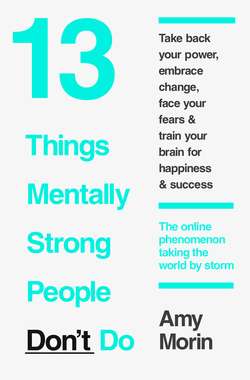Читать книгу 13 Things Mentally Strong People Don’t Do - Amy Morin, Amy Morin - Страница 26
Evaluate Feedback Critically
ОглавлениеNot long before she released an album that sold over ten million copies, Madonna received a rejection letter from the president of Millennium Records that said, “The only thing missing from this project is the material.” Had Madonna allowed that letter to define her singing and songwriting abilities, she might have given up. But fortunately, she kept looking for opportunities in the music industry. Soon after that rejection letter, she landed a record deal that launched her career. Within a couple of decades, Madonna was recognized by the Guinness Book of World Records as the bestselling female recording artist of all time. She holds numerous other records, including the top-touring female artist of all time, and she’s ranked second on the Billboard Hot 100 All-Time Top Artists—second only to the Beatles.
Almost every successful person likely has a similar story of rejection. In 1956, Andy Warhol tried to give one of his paintings to the Museum of Modern Art, but they declined to accept it even for free. Fast-forward to 1989, and his paintings had become so successful that he earned his own museum. The Andy Warhol Museum is the largest museum in the United States dedicated to a single artist. Clearly, everyone has an opinion, but successful people don’t allow one person’s opinion to define them.
Retaining your power is about evaluating feedback to determine if it has any validity. While criticism can sometimes open our eyes to how others perceive us so we can make positive change—a friend points out a bad habit, or a spouse helps you see your selfish behavior—at other times, criticism is a reflection of the critic. Angry people may choose to offer harsh criticism quite regularly just because it relieves their stress. Or individuals with low self-esteem may feel better about themselves only when they put other people down. So it’s important to really consider the source before making any decisions about how you want to proceed.
When you receive criticism or feedback from others, wait a beat before responding. If you’re upset or emotionally reactive, take the time to calm down. Then ask yourself these questions:
• What evidence is there that this is true? For example, if your boss says you are lazy, look for evidence of times when you haven’t worked very hard.
• What evidence do I have this isn’t true? Look for times when you have put in a lot of effort and have been a hard worker.
• Why might this person be giving me this feedback? Take a step back and see if you can find out why this person may be giving you negative feedback. Is it based on the small sampling of your behavior that the person has witnessed? For example, if your boss only watched you work on a day where you were coming down with the flu, she may decide that you aren’t very productive. Her conclusion may not be accurate.
• Do I want to change any of my behavior? There may be times where you choose to change your behavior because you agree with the other person’s criticism. For example, if your boss says you’re lazy, maybe you’ll decide that you haven’t been putting in as much effort at the office as you could. So you decide to start showing up early and staying late because it’s important to you to be a good worker. Just remember, though, that your boss isn’t forcing you to do anything different. You are choosing to create change because you want to, not because you have to.
Keep in mind that one person’s opinion of you doesn’t make it true. You can respectfully choose to disagree and move on without devoting time and energy into trying to change the other person’s mind.
